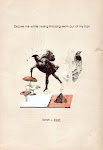 Friday is here, but you were expecting that since Friday is inseparable from Thursday. They are like Siamese twins, Thursday being the workaholic and Friday the devil-may-care. In Europe we change the clocks this weekend, so I’m looking forward to recouping that hour. And on top of that it's Halloween, a kind-of-yes/kind-of-no holiday here. Some people are into it, and there are all kinds of Halloween-themed storefronts and events, but honestly about 68% of the population doesn't know what Halloween is. Not that they should, I just hate having to reckon how much candy to buy, if any, and having to correct the kids who come on the damned wrong day. Without a costume. Twice. Maybe I should turn off the lights and hide in the house, as my great-grandparents used to do.
Friday is here, but you were expecting that since Friday is inseparable from Thursday. They are like Siamese twins, Thursday being the workaholic and Friday the devil-may-care. In Europe we change the clocks this weekend, so I’m looking forward to recouping that hour. And on top of that it's Halloween, a kind-of-yes/kind-of-no holiday here. Some people are into it, and there are all kinds of Halloween-themed storefronts and events, but honestly about 68% of the population doesn't know what Halloween is. Not that they should, I just hate having to reckon how much candy to buy, if any, and having to correct the kids who come on the damned wrong day. Without a costume. Twice. Maybe I should turn off the lights and hide in the house, as my great-grandparents used to do.Elsewhere in the world, I read a couple really good poetry books lately, which made up for some of the incomprehensible poetry I’ve read in the past months. I’ve had a couple buyer’s-remorse moments, something difficult to avoid since I don’t have access to an English language library. (That was one of the interesting things about visiting my mom this month: for the first time in a long time I went to a library and they had loads of interesting stuff you could borrow without having to buy it. Wow. Plus: DVDs!)
Anyway, the last two poetry books I read and loved are Salvinia Molesta by Victoria Chang and Stupid Hope by Jason Schinder.
I’d never heard of Schinder until earlier this year when I ran across his poem "How I Am" some place by chance. I loved this book. Schinder, with the help of his dying mom, managed to break my heart on pretty much every other page. In the book he writes about his mother’s death as well his own impending demise. He has a very endearing voice. I wouldn’t trade this book for anything. My favorite poems in the book were probably “The Good Son” and “How I Am.”
The second was Salvinia Molesta by Victoria Chang. Among the themes are power, love, greed, history, and corruption, and the topics include China’s Cultural Revolution, Enron, infidelity, and suicide, as well as salvinia molesta, the fastest-growing weed in the world.
My favorite section was the first, which confronts modern Chinese history, including Mao and his widow, Taiwan, and the Nanking massacre. These poems were fascinating. The section starts with the poem “Hanging Mao Posters,”and ends with “After Hanging Mao Posters,” which you can read here. In this section I espcially liked “Jiang Qing” (Mao’s widow), and “Proof -”
"...One day he knelt in the street,
sign around his neck
that said: Traitor. Little Red Book spread like wax
on his back..."
The second section was good, too, although I preferred the first (and third). It consists of love poems and love/power poems, dominated by one about a professor having an affair with a student. My favorite poem in this section was “Mulberry Tree,” which takes Van Gogh as its subject. At the poet’s website, click on Poems and you can read “Ars Poetica with Birdfeeder and Hummingbird,” which appears in this section.
The third section is about money and power, and includes a few very interesting poems about Clifford Baxter, an Enron executive who committed suicide. Sounds odd, huh? But it works.





